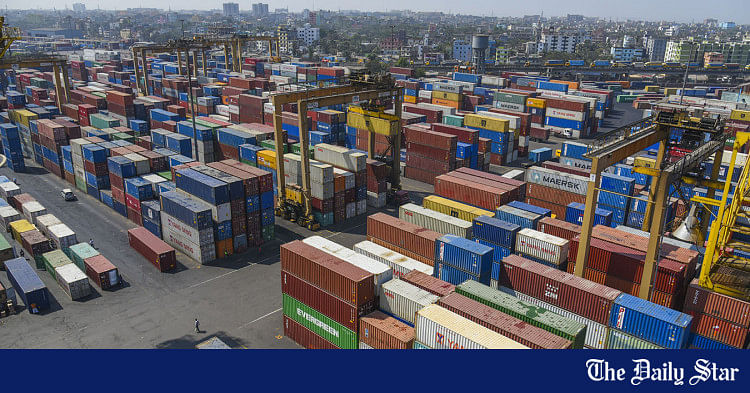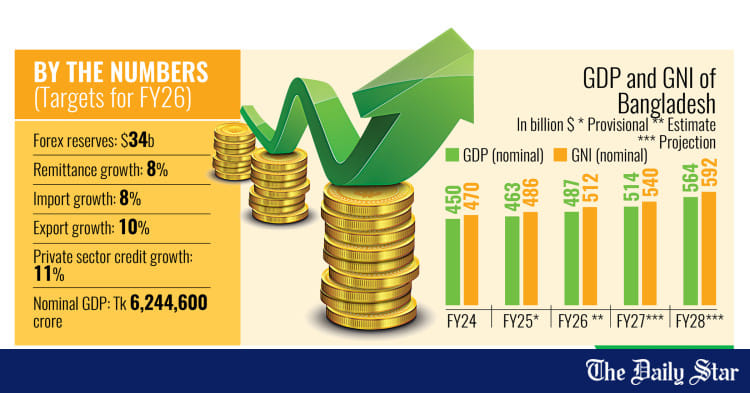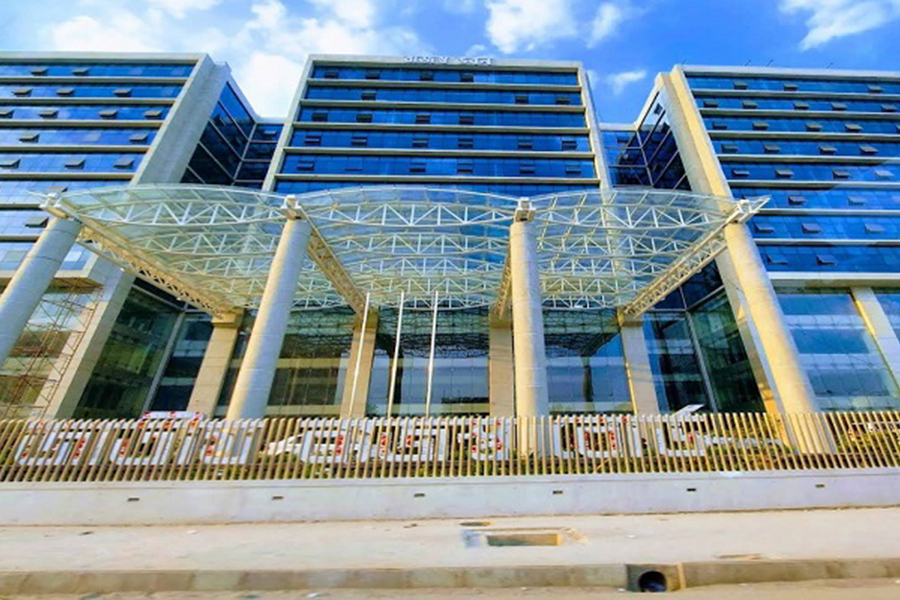- Copy to clipboard
- Thread starter
- #721
Saif
Senior Member
- Joined
- Jan 24, 2024
- Messages
- 15,397
- Reaction score
- 7,865
- Points
- 209
- Nation

- Residence

- Axis Group


Exports hit record high, surpass previous fiscal year in just 11 months
This figure already surpassed the total export earnings of $44.46 billion for the entire 2023-24 fiscal year.
Exports hit record high, surpass previous fiscal year in just 11 months
UNB
Published: 03 Jun 2025, 22: 30

Chattogram port Prothom Alo file photo
Bangladesh has achieved a remarkable milestone in its exporting goods, recording US$44.94 billion during the first 11 months (July-May) of the current fiscal year.
This figure already surpassed the total export earnings of $44.46 billion for the entire 2023-24 fiscal year, signalling the impressive performance of industries.
Overall, export income has seen a significant 10 per cent growth compared to the same period last year, when earnings stood at $40.85 billion, according to export data released by the Export Promotion Bureau (EPB) on Tuesday.
As per the EPB data, export earnings in May alone reached $4.73 billion, an increase of 11.45 per cent compared to $4.25 billion in May of the previous year.
The ready-made garment (RMG) sector, which is the largest contributor to Bangladesh's exports, demonstrated a strong growth of 10.25 per cent. Earnings from this sector amounted to $36.55 billion, up from $33.17 billion in the preceding year.
Within RMG, woven garment exports increased by 9.30 per cent to $16.94 billion, while knitwear exports surged by 10.98 per cent to $19.62 billion.
Several other sectors also contributed significantly to the record export figures.
Agricultural products: Earnings grew by 3.17 per cent to $928 million.
Frozen and live fish: Saw a substantial increase of 17.53 per cent, reaching $410 million.
Leather and leather products: Registered a 12.55 per cent growth, generating $1 billion in income.
Leather footwear: Experienced a remarkable 28.96 per cent rise, with earnings of $620 million.
Non-leather footwear: Grew by 30.25 per cent to $494 million.
Plastic products: Increased by 18.62 per cent to $270 million.
Pharmaceuticals: Saw a 5.25 per cent growth, with earnings of $197 million.
Home textiles: Increased by 4.78 per cent to $825 million.
Areas of decline
Despite the overall positive trend, some sectors experienced a decline:
Jute and jute products: Saw a 4.77 per cent decrease in income, falling to $769 million.
Other leather products: Declined by 3.39 per cent, with earnings of $317 million.
The record export performance in the first 11 months positions Bangladesh strongly to exceed its export targets for the current fiscal year, reinforcing its position in the global trade arena.
UNB
Published: 03 Jun 2025, 22: 30
Chattogram port Prothom Alo file photo
Bangladesh has achieved a remarkable milestone in its exporting goods, recording US$44.94 billion during the first 11 months (July-May) of the current fiscal year.
This figure already surpassed the total export earnings of $44.46 billion for the entire 2023-24 fiscal year, signalling the impressive performance of industries.
Overall, export income has seen a significant 10 per cent growth compared to the same period last year, when earnings stood at $40.85 billion, according to export data released by the Export Promotion Bureau (EPB) on Tuesday.
As per the EPB data, export earnings in May alone reached $4.73 billion, an increase of 11.45 per cent compared to $4.25 billion in May of the previous year.
The ready-made garment (RMG) sector, which is the largest contributor to Bangladesh's exports, demonstrated a strong growth of 10.25 per cent. Earnings from this sector amounted to $36.55 billion, up from $33.17 billion in the preceding year.
Within RMG, woven garment exports increased by 9.30 per cent to $16.94 billion, while knitwear exports surged by 10.98 per cent to $19.62 billion.
Several other sectors also contributed significantly to the record export figures.
Agricultural products: Earnings grew by 3.17 per cent to $928 million.
Frozen and live fish: Saw a substantial increase of 17.53 per cent, reaching $410 million.
Leather and leather products: Registered a 12.55 per cent growth, generating $1 billion in income.
Leather footwear: Experienced a remarkable 28.96 per cent rise, with earnings of $620 million.
Non-leather footwear: Grew by 30.25 per cent to $494 million.
Plastic products: Increased by 18.62 per cent to $270 million.
Pharmaceuticals: Saw a 5.25 per cent growth, with earnings of $197 million.
Home textiles: Increased by 4.78 per cent to $825 million.
Areas of decline
Despite the overall positive trend, some sectors experienced a decline:
Jute and jute products: Saw a 4.77 per cent decrease in income, falling to $769 million.
Other leather products: Declined by 3.39 per cent, with earnings of $317 million.
The record export performance in the first 11 months positions Bangladesh strongly to exceed its export targets for the current fiscal year, reinforcing its position in the global trade arena.




















